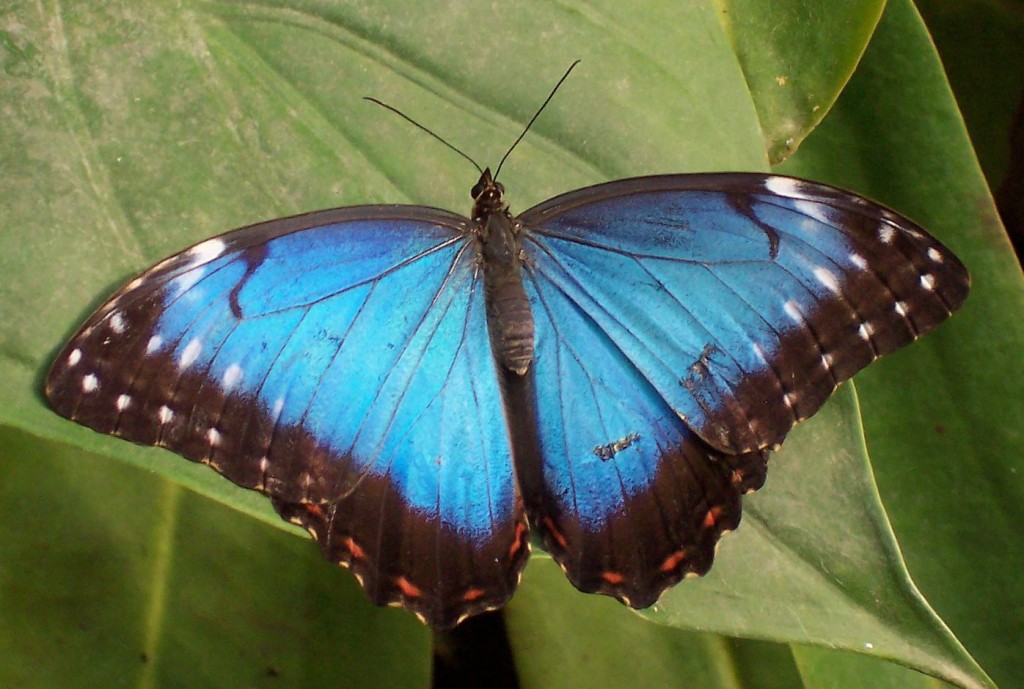
Something coconut flavored in a big, bowl-shaped glass. The sweet smell of suntan oil and the sweat of attractive young people. A sunset. Coronas with lime. Jimmy Buffet.
A 2-foot-long stick insect crawling up your thigh.
The thing about tropical paradise is that the insects can be insane. Sky-blue water and lush vegetation typically coincide with sci-fi spiders and beetles that dine on small children (I am slightly exaggerating.) “Heaven-on-Earth” is disgusting, people, iswhatimsaying. (I like to imagine the real Heaven, if it exists, as a place where smiling angels and cherubs are constantly swatting at baseball-sized flies and fleeing Mothra.)
I’ve always lived in a cold-weather state (Iowa, New York, Wisconsin). And it’s funny: in the depths of winter, nothing seems as desirable as summer. Going to the lake. Picnics. The Fourth of July. You never imagine the insects. You just don’t think of them. “It will be warm!” your soul breathes. The permafrost will melt, seep back into the cracks in the soil, disappear down the storm drains. You will jog. There will be iced coffee and bike rides. People will get tans on their shins.
And you spend the Fourth of July slapping the back of your neck. “Oh, right. That.” You forget about the streams of ants into your kitchen, the mosquitoes buzzing in your ear just as you doze off, those clouds of little gnats above the sidewalks.
A corresponding thing happens when us frigid Northerners contemplate the tropics, I think. You envision beaches, but you will not be entirely comfortable there. Instead, you will be sticky, and never quite sure if that is sweat dribbling down your leg or a huge bug, like the one you saw in the corner of your cabin and crushed, screaming, with a loafer. Bugs, bugs everywhere. Your week in paradise will turn into a mild meth withdrawal.
But it is another level. The lifelessness of a Wisconsin winter is to the insect-world of a Wisconsin summer, as the insect-world of a Wisconsin summer is to the bugaocalypse of the tropics.
These thoughts on the big-bugged tropics were spurred by the annual Bloomin’ Butterflies exhibit at Madison’s Olbrich Botanical Gardens, where I volunteered this weekend. Dan Capps, a Madison-based amateur entomologist who’s been collecting bugs since 1958, had brought some of his mounted butterflies (and moths). One moth must have had a 6-inch wingspan.
This Mothra came from Mexico. I asked Jeff Capps (the collector’s son, who had dropped by to talk butterfly with visitors) if the big ones usually come from warmer, tropical regions. Because, I mean, that seems right. I know the insects in India were, aside from being ever-present, often big. Huge beetles, that just might show up in your rice (ok, it happened once, but it was scarring.) I’ve heard tales of tropical rainforest spiders, etc.
Some light Internet research confirms that it’s generally the case, for at least a couple reasons. Interestingly, mammals tend to grow bigger in colder climates, because the extra body volume helps them retain heat (and, vice versa, lower surface-area-to-volume helps mammals dissipate heat in surfing country). This is called Bergmann’s rule, after the German biologist who thought it up.
Insects, broadly speaking, violate this rule, however. Since the bugs don’t rely on internal heat, the other advantages of warm-weather climates can help them get big. Cold snaps freeze or kill off the bugs, so insects that celebrate a white Christmas have limited growing periods. Warm-weather bugs can keep pushing right on through the holidays, and they have more abundant food, to keep pumping up those thoraxes.
Another “biological rule” also plays a role: the “island rule,” named after Benjamin Island, founder of Island Records. Just kidding, it’s named for the actual masses of land. The isolated island gives small animals more food, with less competition and fewer predators. Since tropical islands tend to, you know, be islands, this rule can give insects a boost. As this post notes, New Zealand, for example, boasts huge-ass beetles, the weta and other big, gross things.

Of course, nature rarely makes itself amenable to simplifying blog posts, and some insect species grow bigger up north, while microclimate can matter more than latitude.
Still, this guy lives in Thailand. You can get some decent Thai food in Madison, but you’ll never find that thing crawling in it. Thank you, winter.
